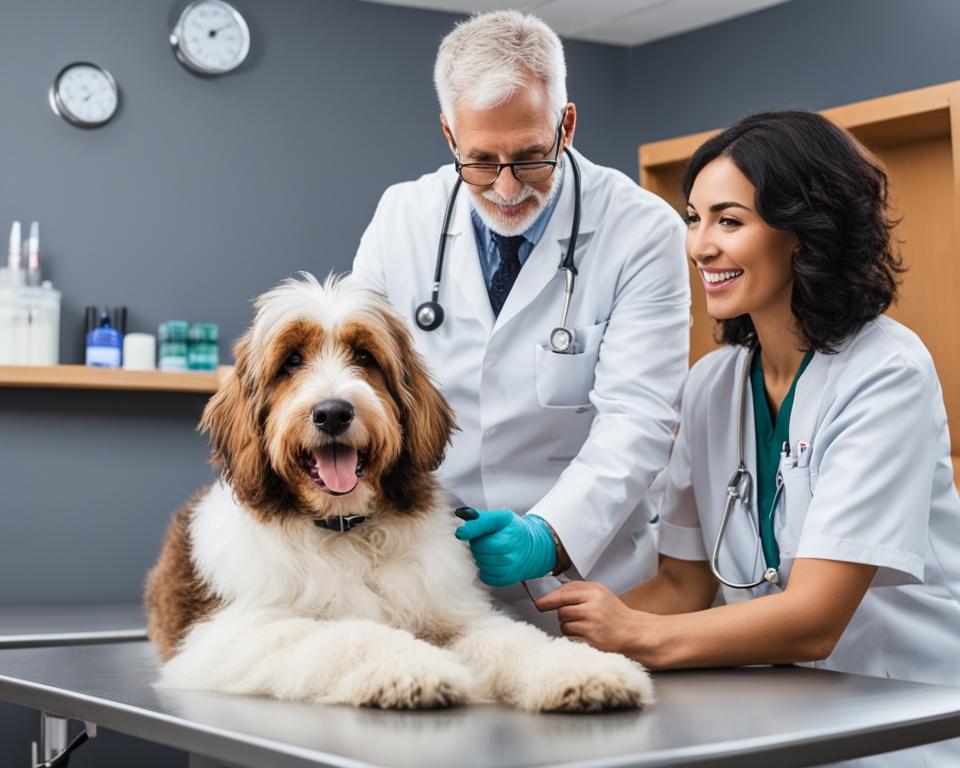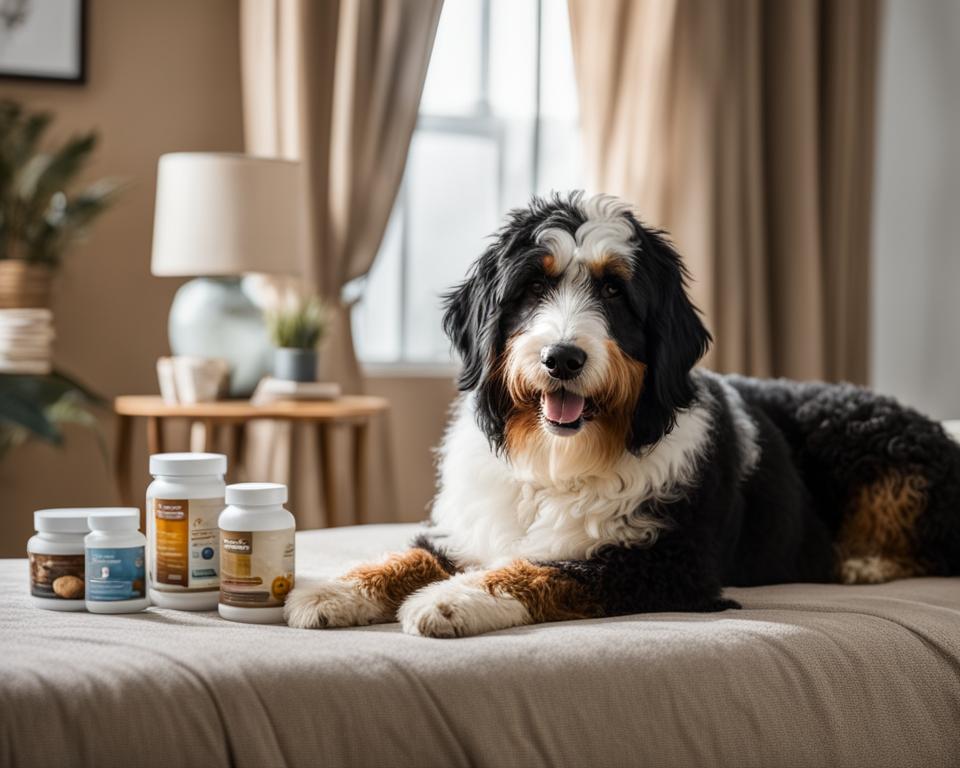Bernedoodles, with their charming appearance and friendly temperament, are beloved crossbreeds that bring joy to many households. As your Bernedoodle ages, it is essential to provide them with the proper care to ensure their health and well-being. In this section, we will explore senior Bernedoodle health care, offering valuable tips and advice to help you provide optimal care for your aging Bernedoodle.
Key Takeaways:
- Senior Bernedoodles require specific care to maintain their health as they age.
- Proper nutrition is crucial for senior Bernedoodles. Consult with your veterinarian for guidance on their dietary needs.
- Regular exercise and mental stimulation are important for keeping senior Bernedoodles physically and mentally fit.
- Grooming and hygiene play a vital role in maintaining the health and appearance of senior Bernedoodles.
- Regular veterinary check-ups are essential for monitoring and addressing any potential health concerns in senior Bernedoodles.
Feeding and Nutrition for Senior Bernedoodles
Proper nutrition is crucial for the health and well-being of senior Bernedoodles. As they age, their nutritional needs change, and it is important to provide them with a balanced diet that meets their specific requirements. Consult with your veterinarian to determine the appropriate portion sizes and feeding schedule for your senior Bernedoodle.
When selecting food for your senior Bernedoodle, opt for high-quality, age-appropriate formulas that are specifically formulated for senior pets. These formulas often contain lower levels of fat and calories to prevent weight gain, which is common in older dogs. Additionally, they may include joint-supporting ingredients such as glucosamine and chondroitin to promote joint health.
It is essential to transition your senior Bernedoodle to a new food gradually to avoid digestive issues. Start by mixing a small amount of the new food with their current food and gradually increase the proportion over several days or weeks, depending on their tolerance. Monitor their stools during the transition period to ensure they are adjusting well.
| Nutritional Requirements for Senior Bernedoodles | Benefits | Food Recommendations |
|---|---|---|
| Protein | Supports muscle maintenance and repair | Quality animal-based protein sources such as chicken, fish, or turkey |
| Healthy Fats | Provides energy and promotes a healthy coat | Fish oil or flaxseed oil for omega-3 fatty acids |
| Fiber | Aids digestion and helps prevent constipation | Fruits, vegetables, and whole grains |
| Antioxidants | Supports immune function and fights cellular damage | Fruits and vegetables rich in vitamins A, C, and E |
| Joint-Supporting Ingredients | Helps maintain joint health and flexibility | Formulas containing glucosamine and chondroitin |
Alongside a balanced diet, ensure that your senior Bernedoodle has access to fresh water throughout the day to stay hydrated. Adequate hydration is important for their overall health and can help prevent urinary tract issues commonly seen in older dogs.
Exercise and Mental Stimulation for Senior Bernedoodles
As Bernedoodles age, their exercise needs may decrease, but they still require regular physical activity to keep them healthy. Daily walks and playtime are essential to keep them physically fit and prevent weight gain. Tailor their exercise routine to their specific needs and abilities. For example, if your senior Bernedoodle has joint issues, consider low-impact activities like swimming or gentle stretching exercises.
In addition to physical exercise, mental stimulation is crucial for the overall well-being of senior Bernedoodles. Engage them in interactive play with puzzle toys or treat-dispensing toys to keep their minds sharp and prevent boredom. Training exercises, such as teaching new tricks or practicing basic obedience commands, can also provide mental stimulation and strengthen the bond between you and your senior Bernedoodle.
Remember to monitor your Bernedoodle during exercise and adjust the intensity or duration as needed. Signs of fatigue or discomfort, such as excessive panting or limping, should be taken seriously, and you should consult with your veterinarian if you have any concerns about your senior Bernedoodle’s exercise routine.
Table: Exercise Recommendations for Senior Bernedoodles
| Exercise Type | Frequency | Duration |
|---|---|---|
| Walks | At least once a day | 20-30 minutes |
| Playtime | Daily | 15-20 minutes |
| Interactive Toys | Regularly | 10-15 minutes |
| Training Exercises | A few times a week | 10-15 minutes |
It is important to note that each Bernedoodle is unique, and the exercise recommendations may vary based on their individual health, energy levels, and any pre-existing conditions. Consult with your veterinarian to develop a personalized exercise plan that meets your senior Bernedoodle’s specific needs.
Grooming and Hygiene for Senior Bernedoodles
As Bernedoodles age, their grooming and hygiene needs may require additional attention. Regular grooming is essential to keep their coat healthy and prevent matting. Brush your senior Bernedoodle at least two to three times a week, paying special attention to sensitive areas such as the ears, tail, and paws. This helps maintain their appearance and prevents any discomfort caused by tangled or matted fur.
In addition to regular brushing, scheduling professional grooming sessions and hair trims is crucial. A professional groomer can help keep their coat clean, tidy, and free from excessive shedding. These sessions also provide an opportunity for the groomer to check for any skin issues or abnormalities that may require veterinary attention. Regular visits to the groomer ensure that your senior Bernedoodle stays comfortable and looking their best.
Dental hygiene is equally important for senior Bernedoodles. Regular brushing and dental check-ups help prevent gum disease, tooth decay, and bad breath. Use a soft-bristled toothbrush and dog-friendly toothpaste to brush your senior Bernedoodle’s teeth daily or as recommended by your veterinarian. This simple routine improves their overall health and prevents dental issues that can lead to more serious health concerns over time.
| Grooming and Hygiene Tips for Senior Bernedoodles |
|---|
| Regularly brush their coat to prevent matting and keep it healthy |
| Schedule professional grooming sessions for hair trims and professional care |
| Pay special attention to sensitive areas such as the ears, tail, and paws during grooming |
| Brush their teeth daily with dog-friendly toothpaste to maintain dental hygiene |
| Visit the veterinarian for regular dental check-ups and cleanings |
Regular Veterinary Check-Ups for Senior Bernedoodles
Regular veterinary check-ups are crucial for ensuring the health and well-being of your senior Bernedoodle. As dogs age, they are more susceptible to a variety of health issues, and early detection is key to successful treatment. By scheduling annual check-ups with your veterinarian, you can stay on top of your senior Bernedoodle’s health and address any concerns before they become serious.
During these check-ups, your veterinarian will conduct a thorough physical examination, checking for any signs of illness or abnormalities. They may also recommend specific tests and screenings to assess your Bernedoodle’s overall health, such as blood work, urinalysis, and x-rays. These diagnostic tools can help identify any underlying health conditions, allowing for timely intervention and management.
Preventive Measures
In addition to regular check-ups, your senior Bernedoodle will require preventive treatments to protect against common health concerns. This includes vaccinations to prevent diseases and parasites, such as fleas, ticks, and heartworm. Your veterinarian will tailor these preventive measures based on your Bernedoodle’s age, lifestyle, and risk factors.
Geriatric Bernedoodle care also involves proactive management of chronic conditions that may arise with age. This could include arthritis, dental disease, or cognitive decline. Your veterinarian may recommend dietary supplements, medications, or lifestyle modifications to alleviate symptoms and improve your Bernedoodle’s quality of life.
| Benefits of Regular Veterinary Check-Ups for Senior Bernedoodles |
|---|
| Early detection and treatment of health issues |
| Monitoring and management of chronic conditions |
| Prevention of diseases and parasites |
| Individualized care based on your Bernedoodle’s needs |
By prioritizing regular veterinary check-ups for your senior Bernedoodle, you are taking an active role in their healthcare and ensuring they receive the necessary attention and support as they age. With proper preventive measures and early intervention, you can help your senior Bernedoodle enjoy a happy, healthy, and comfortable life.

Socialization and Training for Senior Bernedoodles
As our beloved Bernedoodles enter their senior years, it’s essential to continue prioritizing their socialization and training. Despite their age, senior Bernedoodles still benefit greatly from exposure to different environments, individuals, and other animals. This ongoing socialization helps maintain their social skills and ensures they remain comfortable and confident in various situations.
One way to further enhance their overall well-being is through obedience training classes. These classes not only reinforce basic commands but also strengthen the bond between you and your senior Bernedoodle. Training sessions provide mental stimulation, keeping their minds sharp and agile. Additionally, senior Bernedoodles often find comfort and reassurance in the structured routine that training provides.
Continued socialization and training contribute to our senior Bernedoodles’ overall happiness and fulfillment in their golden years. By offering them opportunities to interact with different people, animals, and environments, we provide them with a sense of security and reduce the risk of social anxiety or isolation. Remember, it’s never too late to engage in positive and rewarding experiences with your senior Bernedoodle.
FAQ
How often should I feed my senior Bernedoodle?
Consult with your veterinarian to determine the appropriate portion sizes and feeding schedule for your senior Bernedoodle. They may recommend feeding them two to three times a day, depending on their specific needs.
Is exercise important for senior Bernedoodles?
Yes, regular exercise is still important for senior Bernedoodles. Engage them in daily walks and playtime, taking into account their reduced exercise needs. Tailor their exercise routine to their specific abilities and avoid excessive strain.
How often should I groom my senior Bernedoodle?
Regular brushing, at least two to three times a week, is recommended to prevent matting and keep their coat healthy. Pay special attention to sensitive areas such as the ears, tail, and paws. Schedule regular visits to a professional groomer for hair trimming and maintenance.
How often should I take my senior Bernedoodle to the vet?
Schedule annual check-ups with your veterinarian for your senior Bernedoodle. These visits allow for monitoring their health, vaccinations, and preventive treatments. Regular veterinary examinations help detect any potential issues early and contribute to their longevity and well-being.
Should I continue socializing and training my senior Bernedoodle?
Yes, socialization and training are still important for senior Bernedoodles. Expose them to various environments, people, and other animals to help maintain their social skills. Obedience training classes can reinforce basic commands and strengthen your bond with your senior Bernedoodle.

Leave a Reply